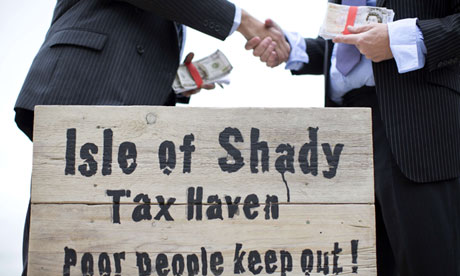It is possible that the G8 will agree a deal on tax havens that will be comprehensive, public and provide rich and poor countries alike with access to the same hitherto highly secret information.
But not this year.
The steps that will be announced at the end of the talks in Lough Erne, unless beefed up considerably in the next 24 hours, will be modest and will disappoint those who thought David Cameron was capable of something meatier. At best they will be the start of a long campaign that will, like the battle to secure debt relief for the world's poorest nations, gather momentum over time.
At worst, the issue will be kicked into the long grass, with much blustery talk about working groups, pilot schemes and consultation processes but little commitment to do anything.
It is worth noting, however, that a year ago the idea that tax havens would be on the G8 agenda at all would have been laughable. So the fact that the west's leaders are discussing the issue is progress.
As is Cameron's success in getting Britain's crown dependencies and overseas territories to commit to a multilateral framework on exchange of information about tax matters. That was something Labour failed to do during its 13 years in power.
It is not hard to see why western governments have become a lot more interested in the shadowy dealings of tax havens and the multinational companies that use them: they need money to fill the black hole in public finances caused by recession. What's more, they are finding that voters are mightily unhappy about footing the bill when the likes of Google and Amazon are able to play the system.
Cameron, of course, could have cracked the whip with the crown dependencies and the overseas territories at any time: he didn't need a G8 summit to do so. But it was obvious that he would not be taken seriously by the rest of the club unless he did put the UK's own house in order.
So far so good. Why, then, are some NGOs concerned about the outcome of the summit? There are three main reasons. The first is that the prime minister's deal with the UK's own tax havens is not nearly as comprehensive or groundbreaking as the hype has suggested.
Tax havens such as the British Virgin Islands will not have to exchange information automatically, will only have to share information they already collect, and will not have to make details of the beneficiaries of account publicly available. Campaigners are particularly unhappy about this issue of beneficial ownership and want to see some signs that the UK is pushing for a public registry, perhaps with a group of like-minded countries such as France and Germany.
The second concern is that the G8 may agree a deal on exchange of tax information that will exclude developing countries on the grounds that they are not ready to take part. There was talk at the weekend of one or two of the bigger and more advanced developing countries taking part or of a pilot scheme that would explore whether poor countries could join in the fullness of time. This, though, will not be enough to satisfy campaigners who point out that developing countries lose three times as much from tax evasion as they get from aid.
Finally, there is the question of where the tax haven issue goes from here. The success of the debt campaign was that it kept the question of unpayable debt on the G8 agenda year after year. But Russia has no great interest in pushing for action on tax havens when it hosts next year's G8 summit, so it may not be until Germany hosts the 2015 meeting that the issue resurfaces.
In the meantime, the G8 may decide to shunt action on tax havens off to the G20 and the Organisation for Economic Co-operation, where any progress will be at a glacial pace.
The coalition that has been lobbying on behalf of developing countries does not know quite to make of all this. It believes Cameron deserves credit for putting tax on the agenda but wants a deal that has substance. As things stand, that is not the case.





















